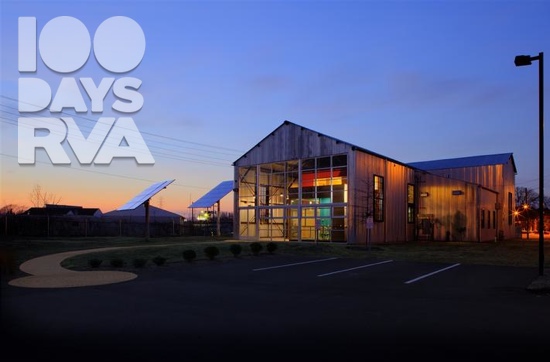Day #077: LEEDership and economic development
Why spend taxpayers’ money LEED certifying Richmond government buildings while subsidizing businesses not held to the same standards?

Inspired by Michael Bierut’s 100 Day Project, 100 Days to a Better RVA strives to introduce and investigate unique ideas to improving the city of Richmond. View the entire project here and the intro here.
- Idea: Extend Richmond’s LEED Silver rating requirement for construction.
- Difficulty: 3 — It’s time to start putting LEED in the conversation between the City and developers.
Our actions don’t always reflect our intentions, but Richmond undoubtedly wants to build a better city for the next generation. In few places is this as important as our actual buildings. Building construction and use are two of the most environmentally taxing human behaviors. In 2009, the city government passed a resolution requiring all new construction, major renovations, or improvements on city government buildings over 10,000 square feet to meet the Leadership in Energy and Environmental Design (LEED) Green Building System’s Silver rating. The City should extend these requirements to all economic development projects they finance.
Sustainability is very slowly clawing its way into the mainstream, but the world won’t be headed in the right direction until sustainability becomes a dominant feature in markets. In economics, a key assumption about competitive markets is perfect information. Third party verification allows companies to compete in tangible ways on sustainability while avoiding greenwashing. This allows customers to make choices on factors other than price.
LEED is a non-profit, third party rater of building design and construction. They have four rankings: certified, silver, gold, and platinum that can be achieved by meeting different criteria.
Few in Richmond know the system as well as Paul Weissend. He runs Dovetail Construction whose Richmond headquarters is the first LEED Platinum, net-energy zero, and registered National Historical Place in the country. Built in a former trolley car barn for the Richmond-Ashland Railway Co., the structure is a building within a building–complete with geothermal wells, solar panels, and all of the newest green gadgets and clever building techniques.
Weissend eats and breathes this stuff. While touring the kitchen of the Brook Road property, he effortlessly switched between his visions of a methane stove fueled by the neighboring Richmond police horse barn and the financial realities of green investment. “Ultimately, it pays for itself. But it’s not a short term return.”
According to the City’s parcel mapper, the building’s location at 1620 Brook Road had its assessment leap from $189,400 in 2008 to $528,600 in 2009. The result is an impressive return on investment. Weissend’s electricity bill is just a $14 registration fee every month. The solar panels paid for themselves in the first year. The aesthetics are unbelievable, and it is one of the few places in Richmond that is cutting edge in the world.
Around the same time the Dovetail Headquarters was being built, the city upped its green game. The recently opened Fire Station #17 earned LEED Silver and Broad Rock Elementary School and Oak Grove-Bellemeade elementary school earned LEED Gold rankings.
If sustainability and green-construction are priorities for the City then they should require LEED Silver ratings for all publicly funded economic development projects. With Stone Brewing Co. coming to Richmond, the City putting out bids for Boulevard development, and the Shockoe Bottom stadium plans at least creating the potential for hundreds of thousands of square feet of construction, the need for such a decision has never been so important.
Economic development is designed to attract businesses to Richmond by lowering the costs of doing business, but according to the City’s resolution, “the fiscal impact to include Green Building LEED requirements will be approximately a 3% additional outlay on proposed construction.” Furthermore, it doesn’t make sense to spend taxpayer money “greening” city buildings while spending taxpayer money subsidizing surface parking lots and sports fields that are held to significantly lower standards.
Richmond, Dovetail Construction, and others are early adopters in the future norms of building and design practice. It’s time for the City to start handing over LEED requirements when spurring economic development with taxpayer money.
Other LEED Platinum Buildings in Richmond
- Moseley Architects New Office
- Augusta Project
- Hungary 1 – Idea House
- VCU Rice Center Educational Building
Love this idea? Think it’s terrible? Have one that’s ten times better? Head over to the 100 Days to a Better RVA Facebook page and join in the conversation.
Photo by: Dovetail Construction
-
Recommend this
on Facebook -

Report an error
-

Subscribe to our
Weekly Digest





Notice: Comments that are not conducive to an interesting and thoughtful conversation may be removed at the editor’s discretion.